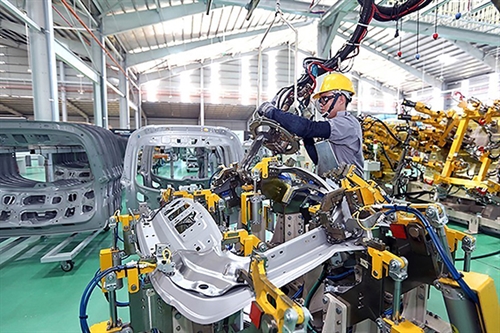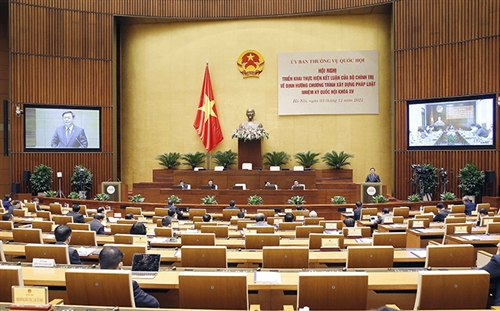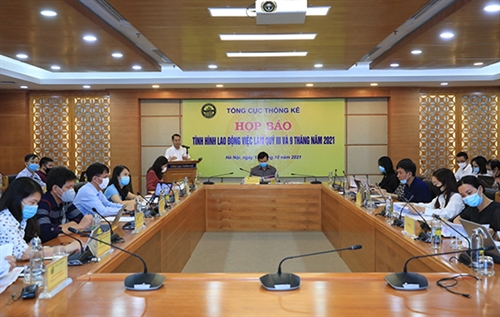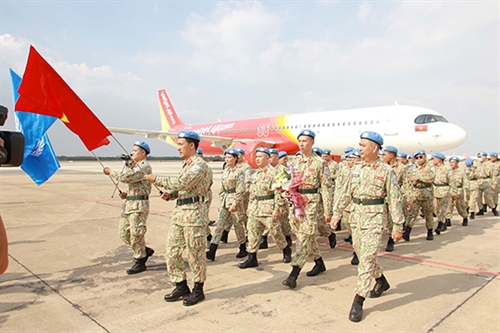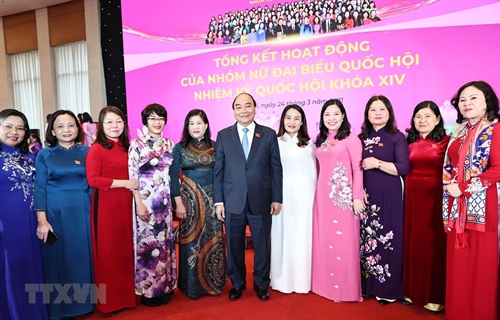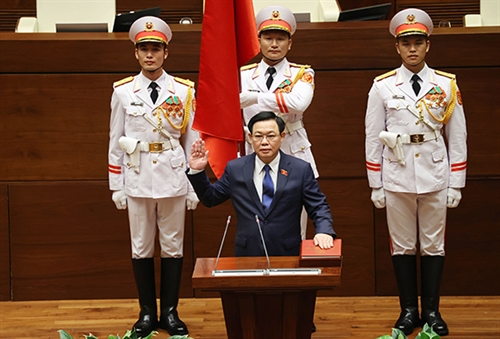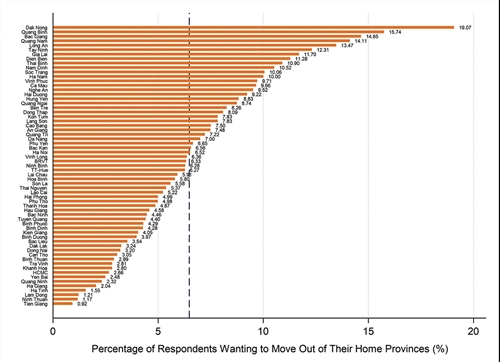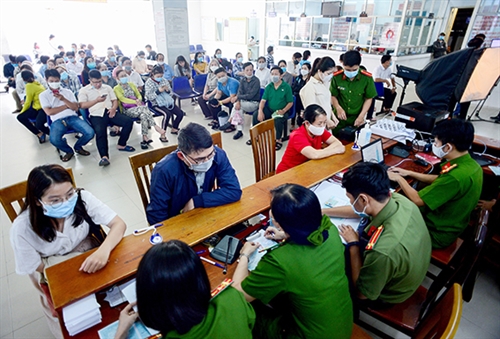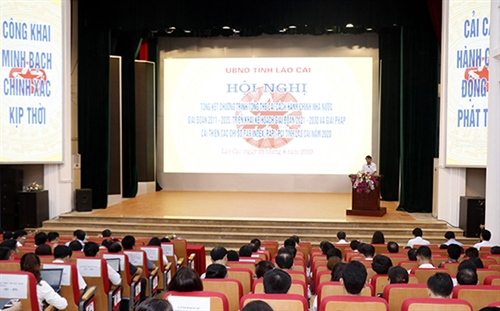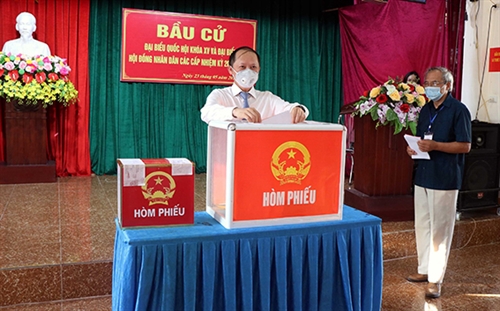Party General Secretary Nguyen Phu Trong asked the diplomatic sector to inherit the flexible and creative but still fierce and resilient foreign policies applied by late President Ho Chi Minh while speaking at the first National Conference on Foreign Affairs held in Hanoi on December 14 in both in-person and virtual forms.
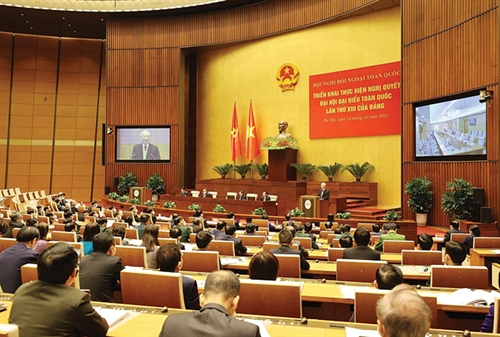 |
| Party General Secretary Nguyen Phu Trong addresses the first-ever National Conference on Foreign Affairs in Hanoi on Dec. 14__Photo: Tri Dung/VNA |
This is the first time a symposium on external affairs has been organized since the establishment of the Party and the birth of the Democratic Republic of Vietnam.
The Conference aims to thoroughly promote the Resolution of the 13th National Party Congress, especially policies, guidelines and orientations regarding foreign affairs of the Party, people and army.
The Party leader said over the past 90 years, under the leadership of the Party and President Ho Chi Minh, on the foundation of creatively applying the basic principles of Marxism-Leninism, inheriting and promoting the external affairs’ tradition and identity, as well as diplomacy and national culture, selectively absorbing the world culture and progressive thoughts of the times, Vietnam has built up unique diplomacy of the Ho Chi Minh era, which is called “bamboo diplomacy”.
Inheriting the bamboo’s characteristics of being solidly rooted but having flexible branches, “bamboo diplomacy” refers to foreign policies which are flexible, changeable to each situation and creative but still fierce and resilient ahead of challenges.
The Party chief said after 35 years of doi moi (renewal), our country’s position and power have changed. Vietnam must “raise a stronger voice and show a more active foreign policy stance, first of all in the region” and promote innovation to expand into new fields, seek new partners, and take new directions. Innovation must be on the basis of upholding principles, certainty, prudence, steadfastness in goals, and sincerity and humility, he said.
Trong asked the diplomatic sector to continue to thoroughly grasp and properly implement the foreign policy of independence, self-reliance for peace, cooperation and development, multilateralization and diversification, as well as active international integration for national interests.
One of the key requirements is to be always patient, calm, lucid and smart, and to properly handle foreign relations, including sovereignty and territorial matters, the Party chief said, adding that this is a very important task of the entire political system in which the diplomatic sector takes the lead.
He pointed to the necessity to maximize all favorable factors of the country so as to help build and shape multilateral mechanisms, and implement Directive 25-CT/TW on promoting and elevating multilateral external relations toward 2030.
The development of an overall strategy on multilateral foreign affairs toward 2030 is considered an important strategic orientation, Trong added.
He urged the diplomatic sector to expand and improve the effectiveness of foreign affairs, especially in political, national defense-security, economic, cultural cooperation while maintaining collaboration with other countries, giving priority to ensuring stability and promoting political trust, addressing differences and arising issues in the spirit of cooperation, friendship, control of disagreements, based on international law and regional practices.
The diplomatic sector is also asked to improve the effectiveness of economic diplomacy serving the country’s sustainable development, and promote the implementation of overseas Vietnamese affairs.
Trong noted that the diplomatic sector needs to pay attention to strategic research and forecasting, focusing on carefully assessing trends in policy and relations between great powers, neighboring countries, as well as political, economic, and socio-cultural trends in the world and in the region, especially in the face of impacts of the Fourth Industrial Revolution, digital transformation, digital economy, digital society and the dangers of epidemics and climate change.
He also highlighted the importance of training diplomats and foreign affairs officers in terms of qualifications, capacity and political bravery.
Three-pillar diplomacy
Delivering a report on the situation, orientations and key foreign affairs tasks to implement the Resolution of the 13th National Party Congress, Deputy Prime Minister Pham Binh Minh underscored the need to build a comprehensive and modern diplomatic sector based on three key pillars of Party diplomacy, State diplomacy and people-to-people diplomacy, saying this contributes to the successful implementation of the country’s development goals and the foreign policy set out by the 13th National Party Congress.
Minh also emphasized the importance of ensuring the Party’s leadership and the State’s centralized management of foreign affairs and international integration as well as thoroughly promoting and implementing foreign policies set forth at the 13th National Party Congress through strategies, plans, programs and projects on foreign affairs and international integration.
“The objective of foreign policy is to guarantee the highest interests of the nation on the basis of fundamental principles of the United Nations (UN) Charter and international law, equality, cooperation and mutual benefit.
“The foreign policy direction is to proactively, synchronously, creatively and effectively conduct foreign affairs activities, including the three key pillars of diplomacy, and diplomacy at all levels, sectors and localities,” Minh said.
“The basic task is to continue promoting the pioneering role of foreign affairs in creating and maintaining an environment of peace and stability, mobilizing external resources for national development and defense, and elevating the position and prestige of the country,” the official said.
It is also important to closely combine foreign affairs and national defense-security to create a firm foothold, maintain the national sovereignty and territorial integrity as well as mobilize external resources for national development, he said.
The diplomat proposed more effective and creative multilateral foreign affairs work, contributing to building and shaping multilateral institutions and political-economic order, especially the ASEAN, the UN, international and regional inter-parliamentary cooperation mechanisms (such as AIPA and IPU), APEC, Mekong sub-regional cooperation, as well as in international issues of strategic importance, in conformity with the requirements, capabilities and conditions of Vietnam.
Importance of diplomacy work across spheres
Head of the Party Central Committee’s Commission for External Relations Le Hoai Trung said the 13th National Party Congress set forth the guidelines for external affairs, aiming to build a comprehensive and modern diplomacy based on the abovesaid three pillars.
In Party diplomacy, it is necessary to pay attention to and improve the quality of research and strategic consulting, while keeping a close watch on the world situation and political trends, the official said.
Party diplomacy should be a pillar in putting forth master strategies for relations with neighbors and other countries, Trung said, adding that Party diplomacy and people-to-people diplomacy would promote mutual understanding and international support for national reform, construction and defense.
He also affirmed the pivotal position of people-to-people diplomacy in building and strengthening the social foundation for relations between Vietnam and other countries and called for consensus of overseas Vietnamese.
In her remarks at the Conference, President of the Vietnam Union of Friendship Organizations Nguyen Phuong Nga said people-to-people diplomacy has reaped great achievements and made significant contributions in different periods of the Vietnamese revolution.
She noted that people-to-people diplomacy, together with Party diplomacy and State diplomacy, has boosted the normalization of relations with major partners and mobilized the support of international friends for the settlement of war consequences and national reconstruction.
To enhance the role of people-to-people diplomacy, Nga suggested raising awareness in the entire political system about the significance of people-to-people diplomacy, strongly reforming operations across spheres, and completing mechanisms and policies to ensure financial and human resources for people-to-people diplomacy.
She proposed the Party Central Committee’s Secretariat soon issue a new directive on people-to-people diplomacy to replace Directive 04 of 2011 to match its new role and tasks.
Other delegates at the Conference also expressed their opinions on the importance of diplomacy work across different sectors.
Meanwhile, Deputy Minister of National Defense Sen. Lieut. Gen. Hoang Xuan Chien said that over the past years, the defense diplomacy work has been carried out synchronously, comprehensively, flexibly and effectively in both bilateral and multilateral aspects.
He went on to say that Vietnam has to date established defense ties with more than 100 countries around the world, with many substantial and effective cooperation mechanisms such as training and exchange of military delegations, cooperation between armed forces, defense industry, and UN peacekeeping operations, among others. These activities have contributed to firmly safeguarding independence, sovereignty and territorial integrity of the nation, and consolidating and raising the position and prestige of the country and the Vietnamese people’s army in the international arena.
In the time to come, the Central Military Commission and the Ministry of National Defense will continue to concretize and organize the implementation of defense diplomatic activities in accordance with the foreign policy set out by the 13th National Party Congress, considering defense diplomacy as a key task and an important part of the three pillars of diplomacy.
Chien said it is important to keep the stance of defending the Fatherland early and from afar in peacetime, making efforts to prevent conflicts, settle disputes by peaceful means, in accordance with international law, thus contributing to building a peaceful environment, and strengthening strategic trust with partners for national development.
Efforts will be made to promote multilateral defense diplomacy, make effective proposals, and participate in regional and international security architectures, especially defense cooperative mechanisms within the framework of ASEAN, and actively join UN peacekeeping operations, he added.
Deputy Minister of Public Security Lieut. Gen. Luong Tam Quang highlighted the significance of ensuring security and order within the scope and territory of the national border and in non-traditional security issues and international issues for which many countries and international organizations are responsible, as well as the role and tasks of the police force in performing the external affairs of the Party, State and people.
He said to successfully implement the foreign policy set out by the 13th National Party Congress, the police force will continue expanding collaboration with law enforcement forces of other countries and international organizations, and actively participating in political and security institutions and addressing global security and order issues.
Quang stressed the close combination between diplomacy and other professional measures to proactively prevent and defeat all plots and sabotages by hostile forces. He also highlighted the need to firmly consolidate the security line from afar, from beyond borders and territories, effectively handle security challenges, and fight transnational crimes.
New strategic period
Addressing the Conference, Minister of Foreign Affairs Bui Thanh Son said, together with the country’s development, the diplomatic sector was entering a new strategic period.
The foreign policies set out by the 13th National Party Congress, which focus on building a comprehensive and modern diplomatic sector based on the abovementioned three pillars of diplomacy, “reflect the maturity of Vietnam’s revolutionary diplomacy. This is also a new strategic, long-term and urgent requirement for the sector in the new national development period,” Son said.
Regarding future orientations of the foreign affairs sector, the diplomat proposed closely combining political diplomacy, economic diplomacy, cultural diplomacy, external information, overseas Vietnamese work and citizen protection. Other proposals include taking full advantage of sound political relations, favorable international factors, and international agreements to mobilize external resources, effectively combined with domestic resources for growth innovation toward sustainable and inclusive development, industrialization and modernization, and strengthening national unity.
Besides traditional fields, the diplomatic sector will actively seek new directions in new fields such as technology diplomacy, digital, environmental, health diplomacy and energy diplomacy in order to meet the needs of the country’s development in the new period.
The sector will also accelerate the building and consolidation of relevant institutions, policies and laws, and step up modernization and digital transformation in the diplomatic work, Son said.
However, the core task lies in personnel development, he said, stressing that diplomats must have a good background in politics, ideology, morality, knowledge and working style.- (VLLF)
